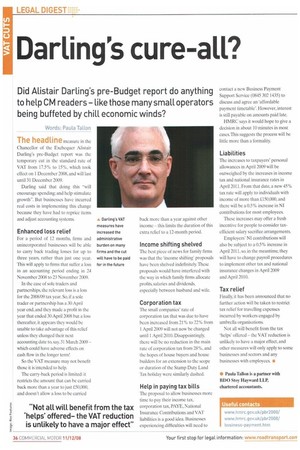Darling's cure-all?
Page 36

If you've noticed an error in this article please click here to report it so we can fix it.
Did Alistair Darling's pre-Budget report do anything to help CM readers like those many small operators being buffeted by chill economic winds?
Words: Paula "ration The headline measure in the Chancellor of the Exchequer Alistair Darling's pre-Budget report was the temporary cut in the standard rate of VAT from 17.5% to 15%, which took effect on 1 December 2008, and will last until 31 December 2009.
Darling said that doing this "will encourage spending; and help stimulate growth". But businesses have incurred real costs in implementing this change because they have had to reprice items and adjust accounting systems.
Enhanced loss relief
For a period of 12 months, firms and unincorporated businesses will be able to carry back trading losses for up to three years, rather than just one year. This will apply to firms that suffer a loss in an accounting period ending in 24 November 2008 to 23 November 2009.
In the case of sole traders and partnerships, the relevant loss is a loss for the 2008/09 tax year. So, if a sole trader or partnership has a 30 April year end, and they made a profit in the year that ended 30 April 2008 but a loss thereafter, it appears they would be unable to take advantage of this relief unless they changed their next accounting date to, say, 31 March 2009 — which could have adverse effects on cash flow in the longer term!
So the VAT measure may not benefit those it is intended to help.
The carry-back period is limited: it restricts the amount that can be carried back more than a year to just £50,000, and doesn't allow a loss to be carried back more than a year against other income — this limits the duration of this extra relief to a 12-month period.
Income shifting shelved
The best piece of news for family firms was that the 'income shifting' proposals have been shelved indefinitely. These proposals would have interfered with the way in which family firms allocate profits, salaries and dividends, especially between husband and wife.
Corporation tax
The small companies' rate of corporation tax that was due to have been increased from 21% to 22% from 1 April 2009 will not now be changed until 1 April 2010. Disappointingly, there will be no reduction in the main rate of corporation tax from 28%, and the hopes of house buyers and house builders for an extension to the scope or duration of the Stamp Duty Land Tax holiday were similarly dashed.
Help in paying tax bills
The proposal to allow businesses more time to pay their income tax, corporation tax, PAYE, National Insurance Contributions and VAT liabilities is a good idea. Businesses experiencing difficulties will need to contact a new Business Payment Support Service (0845 302 1435) to discuss and agree an 'affordable payment timetable'. However, interest is still payable on amounts paid late.
HMRC says it would hope to give a decision in about 10 minutes in most cases. This suggests the process will be little more than a formality.
Liabilities
The increases to taxpayers' personal allowances in April 2009 will be outweighed by the increases in income tax and national insurance rates in April 2011. From that date, a new 45% tax rate will apply to individuals with income of more than £150,000, and there will be a 0.5% increase in NI contributions for most employees.
These increases may offer a fresh incentive for people to consider taxefficient salary sacrifice arrangements.
Employers' NI contributions will also be subject to a 0.5% increase in April 2011, so. in the meantime, they will have to change payroll procedures to implement other tax and national insurance changes in April 2009 and April 2010.
Tax relief
Finally, it has been announced that no further action will be taken to restrict tax relief for travelling expenses incurred by workers engaged by umbrella organisations.
Not all will benefit from the tax 'helps' offered — the VAT reduction is unlikely to have a major effect, and other measures will only apply to some businesses and sectors and any businesses with employees. •
• Paula Talon is a partner with BDO Stoy Hayward LLP. chartered accountants.




























































































































































